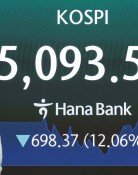Inflated Stock Predictions Cause Serious Losses
Inflated Stock Predictions Cause Serious Losses
Posted August. 06, 2005 06:18,
Its too overblown.
After major public companies listed on the Korea Securities Dealers Automated Quotation (KOSDAQ), such as Jusung Engineering Co. and Webzen, disclosed their corporate performance reports, shareholders voiced their complaints. On August 3, the two companies released quarterly income statements that fall far short of their earlier predictions. To be fair, corporate performances can be either better or worse than earlier predictions.
However, the cause of the complaints was the companies rosy predictions that they apparently wont realize this year. Investors who believed the inflated predictions of the companies had to suffer losses due to plummeting stock prices.
Inflated Predictions-
Jusung Engineering, a semiconductor equipment manufacturing company, reduced its business results for this year on August 3 in an official announcement. Its sales goal was reduced by 41 percent from 223.7 billion won at the beginning of this year to 131.8 billion won, and operating profits were cut by as much as 75.5 percent to 13.3 billion won. Sales and operating profit goals were reduced by half and by three quarters, respectively.
On this day, Webzen, an online game company, announced that its sales were offset by its losses in a shocking second quarter income statement. Over the period, the company posted 7.5 billion won in sales and 6.7 billion won in losses.
The company had announced that it expected 62.5 billion won in sales and 15 billion won in operating profits earlier this year. However, in the first quarter from January to June, its profit and loss statement showed that the companys performance lagged far behind the predictions with 16.9 billion won in sales and 6.9 billion won in operating losses.
Jusung Engineering made experts puzzled by saying that the company is expected to achieve one trillion won in sales in 2007, when it downgraded its sales prediction.
Most securities firms assess that the company will see about 200 billion won in sales in 2007. Its sales prediction of one trillion won was overblown.
Investors Stand to Lose-
It is understandable that companies set optimistic goals about themselves. However, predictions that have to be revised over 50 percent deserve criticism for misleading stockholders.
Investors have seen big losses. The stock price of Jusung Engineering dropped by the maximum daily permissible limit on August 3 and further plummeted 8.52 percent on August 4, reducing the total market value of the company by a quarter. Webzen is no different. The companys stocks dropped to the daily permissible bottom on August 3 and one fifth of its capitalization disappeared in just three days.
The problem is that there is no regulation to prevent such practices. Companies can get around the liabilities because they warn their shareholders that predictions can be different from the real business results in their annual statement of performance prediction.
Investors can get more transparent performance reports if companies release their income statements monthly, not quarterly. Yet this is not mandated by law and companies are reluctant to disclose their business report cards. Jusung Engineering, for instance, changed from monthly announcements to quarterly ones, citing stock prices are prone to distortion because of the shareholders who respond promptly to monthly business results.
Jang Young-soo, a researcher of Dongbu Securities Co., said, Because there are no ways to curb companies from inflating their performance predictions, companies should release frank and realistic predictions with a commitment to build trust.
Wan-Bae Lee roryrery@donga.com







